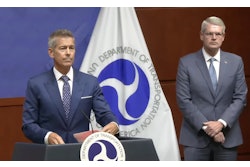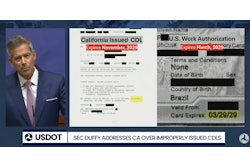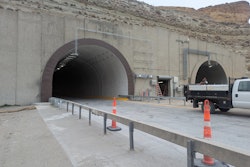President Donald Trump's English language mandate for drivers, DOT's new rule tightening rules for non-citizen drivers, and serious immigration enforcement on the interstates might push as many as 800,000 CDL holders out of commercial driving, according to a study written for J.B. Hunt by Noël Perry of Transport Futures.
If the Trump administration "is successful in all its immigration-related programs, it would reduce the driver population by almost 16%, or 614,000 drivers," wrote Perry.
- Perry's analysis predicts major impacts on trucking capacity, likely bigger than the 2017 ELD mandate, from recent regulatory actions.
- Another analyst said realistically year-end 2026 might see a "market that is like 2021" with big freight-rates run-ups.
- Road rumors abound about parking lots emptied of non-domiciled CDL holders, and big things on the way, among some of trucking's insurers and brokers -- if they've even heard of the rule changes, that is.
Noël Perry reasons his nearly 16% driver drop by making a few assumptions based on public data. Overdrive caught up with Perry who said that much depends on enforcement, but in any event, recent regulatory action at DOT is a "really big deal."
"Immigrants, legal and illegal, make up 20% of the U.S. population," he writes, though other estimates peg the number around 15%. "Their share of difficult work is undoubtedly higher, ranging from 25% to 40%, depending on the sector."
Perry told Overdrive the 25% to 40% was his own estimate. Overall, the paper settles on a "conservative estimate of 25% for immigrants in trucking in this analysis, reasoning that the difficulties of trucking work attract immigrants, similar to those in construction and agriculture."

[Related: Why state police are letting drivers placed OOS for English violations go free]
The big components of the 614,000 number include an estimated 197,000 drivers that can't speak English, 252,000 more non-citizens without documentation of legal presence in the country, and 167,000 otherwise qualified drivers pushed out by DOT's new non-domiciled CDL rules.
Of course, that's all on paper. Perry's paper finds it credible that authorities will enforce the new rules effectively.
Cracking down on non-English speakers or unauthorized drivers would be "certainly no more difficult than closing the southern border," which the Trump administration has already largely succeeded in doing, said Perry. Perry estimated anywhere from 400,000 to 800,000 could see the door in the coming years thanks to recent regulatory actions.
But Perry admits there are always exceptions. Trump's tariffs and that immigration enforcement remain sensitive to economic realities.
"Farms, as an example, have not been a priority," Perry said. Indeed it's widely known that migrant workers do much of the country's fruit picking work in fall, and despite a few widely publicized raids, the Trump administration has mostly left those workers alone.
Overall, Perry predicts big shocks to the market as non-citizens leave, including a healthy lift to the spot market.
 This chart presents the changes in driver hiring demands and the changes in spot market pricing. Overall, Perry expects immigration enforcement to impact the market more than the ELD mandate in 2017. "The red bars indicate a plausible spot pricing scenario caused by the immigration regulations," Perry wrote. Noël Perry, Transport Futures
This chart presents the changes in driver hiring demands and the changes in spot market pricing. Overall, Perry expects immigration enforcement to impact the market more than the ELD mandate in 2017. "The red bars indicate a plausible spot pricing scenario caused by the immigration regulations," Perry wrote. Noël Perry, Transport Futures
"Immigration policies have a very substantial effect on hiring, not only weeding out immigrants already in the workforce, but preventing further immigrants coming through for hiring," said Perry.
Imagine, for example, Trump's immigration crackdown removes 500,000 CDL drivers from commercial driving. That can be considered as a one-time shock, but the changed requirements would keep about 100,000 from getting hired in trucking each year hence, reasons Perry in the paper.
"This is the biggest regulatory effect on the industry since the HOS back in 2013 got reversed," said Perry, a reference to the suspension of 2013 changes to 34-hour restart restrictions that limited the restart's use significantly.
J.B. Hunt's research on immigration impacts on trucking also cites Avery Vise, vice president of trucking at FTR Transportation Intelligence, predicting a potential market shift to the positive. Vise in October said DOT's move to restrict non-domiciled CDL issuance to non-citizens "has not had anything [like what] I would call an immediate effect."
Although rates ticked up slightly right after DOT announced the rule, Vise said the market "saw the same phenomenon" during the same week last year, and rates have since ebbed and flowed -- last week's tickers showed rates in major segments more or less flat to slightly up since the DOT's rule-change announcement.
Yet with time, as non-domiciled drivers are unable to renew CDLs under the terms of the new rule, Vise could see by year-end 2026 "a market that is like 2021" -- in other words, a rates bonanza.
That's an optimistic forecast that holds all other variables (freight volumes, employment and manufacturing outputs) constant. Vise expects enforcement of the new rule to certainly push tens of thousands of drivers out of the market. At once, he added there's likely overlap between that group and those adversely impacted by new out-of-service enforcement of English proficiency requirements. Other shocks to carriers' bottom lines, like insurance hikes in the new year, might also be a knock on carriers who can't afford higher premiums, putting more out of business.
Similarly, Perry said a recession could happen, in which case "weak demand will offset some of the regulatory effects," really taking the pop off any spot market rally.
In the "worst-case scenario," trucking could get hit with a massive one-two punch of "a near-term recession reducing capacity, followed by a recovery just as immigration restrictions reach maturity," he said. Basically, that would mean immigration enforcement bleeding capacity out of trucking all through 2026, but a muted market recovery due to weak demand. Then, assuming the economy recovers in 2027, low capacity and higher barriers to entry for motor carriers could constrain capacity.
That scenario would likely hurt big carriers like J.B. Hunt, but might suit owner-operators who thrive in tight-capacity markets.
Overdrive also queried insurers to see if they'd seen new non-domiciled CDL rules impacting coverage for carriers.
"I have reached out to nearly all trucking insurers by this point. None of them are precluding or rescinding coverage" for non-domiciled CDL drivers, said a VP at a large insurer. The VP said senior underwriters for major insurance operations "are treating those drivers as normal drivers."
Almost every broker and insurer Overdrive spoke to had heard stories of some carriers losing 30-60 drivers overnight. Secondhand, stories of drivers afraid to come into work, or to run certain routes known for immigration enforcement, aren't hard to find. Yet talk among brokers and insurers has been mostly rumors for now. That is, if they've even heard about the rule changes.
"I will say that most insurance underwriters have no clue what I’m talking about when I ask about" non-domiciled CDLs, said the VP. "A lot of the time they think I'm asking about international drivers (Mexico, Canada) whose CDL is recognized" by the United States.
The insurance VP said he handles insurance applications for some carriers "whose drivers were almost all [non-domiciled CDL] holders," and that they've come back with "pricing for standard CDL drivers."
Another insurance agent relayed stories of non-citizen drivers abandoning or even stealing trucks, and said that underwriters are just now beginning to ask about non-domiciled CDLs. But that agent added that insurance was a "very slow-moving business," and that people were just now waking up to the new rule.
Brokers, too, seemed to be playing catch-up with DOT's recent moves. One said he'd seen slightly higher rates in recent weeks, with loads being a bit harder to cover, and rumors from higher up that "something is happening and they think it could be a big Q4."
[Related: Non-domiciled CDL drivers say DOT’s new rule violates their civil rights]











